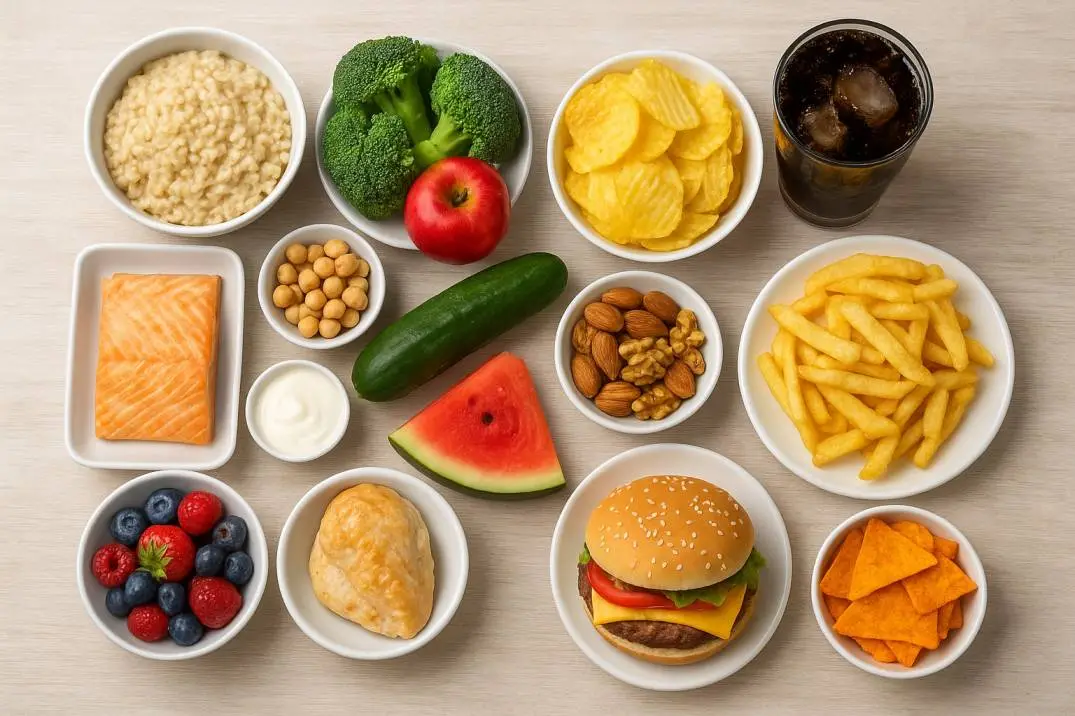What To Eat After Hernia Surgery and What To Avoid ?
Recovering from hernia surgery is a crucial process that involves more than just rest—what you eat plays a significant role in how quickly and smoothly you heal.
Post-surgery nutrition helps your body repair tissues, reduce inflammation, and avoid common issues like bloating or constipation.
Whether you’ve undergone inguinal, umbilical, or hiatal hernia surgery, choosing the right foods and avoiding the wrong ones can make all the difference.
This guide will walk you through everything you need to know to support your recovery with a diet tailored to healing.

Foods to Eat After Hernia Surgery
Your body needs the right nutrients to promote healing and avoid complications. Focusing on high-quality foods will help you feel stronger and reduce any post-operative discomfort. Here are the top food groups to consume during recovery:
1. High-Fibre Foods
Constipation is a common side-effect after hernia surgery due to the impact of anaesthesia, pain medications, and reduced activity levels. Fibre helps regulate bowel movements and keeps your digestion smooth, reducing strain on your already healing body.
Examples of High-Fibre Foods:
- Whole grains, such as oatmeal, brown rice, and whole wheat bread
- Legumes like lentils, chickpeas, and black beans
- Fruits such as apples, pears (with skin), and berries
- Vegetables such as broccoli, spinach, carrots, and sweet potatoes
2. Lean Proteins
Protein is essential for tissue repair and muscle recovery. It helps rebuild the body’s cells, which is vital after surgery. Opt for lean protein sources to avoid excess fat that may slow digestion.
Best Protein Choices:
- Skinless chicken, turkey, or fish like salmon and cod
- Plant-based options like tofu, edamame, and tempeh
- Eggs and low-fat dairy products including cottage cheese and Greek yoghurt
3. Anti-Inflammatory Foods
Certain nutrients can help reduce inflammation, which is essential to minimise swelling around the surgical site and ease discomfort.
Good Anti-Inflammatory Options:
- Fatty fish (rich in omega-3 fatty acids), such as salmon, mackerel, and sardines
- Olive oil as a healthy fat alternative to butter
- Nuts like walnuts or almonds
- Turmeric and ginger, known for their anti-inflammatory properties, can be added to teas or dishes
4. Foods That Promote Hydration
Staying hydrated is just as important as eating the right foods. Dehydration can worsen constipation and slow the healing process. Make water your go-to beverage, and supplement with hydrating foods such as cucumbers, watermelons, and oranges.
Additional Tips:
If plain water feels repetitive, try herbal teas, infused water with citrus slices, or natural broths to keep your fluid intake high.
Foods to Avoid After Hernia Surgery
While some foods help you recover quickly, others can hinder your progress by causing bloating, gas, or constipation. Below is a list of foods to avoid during recovery:
1. Processed Foods
Processed and packaged foods are often high in salt, sugar, and unhealthy fats. These can cause water retention and bloating, putting additional strain on your abdomen.
Examples to Avoid:
- Frozen meals
- Fast food
- Packaged snacks like crisps and biscuits
2. Carbonated Beverages
Fizzy drinks like soda and sparkling water introduce gas into your stomach, causing bloating and discomfort. Opt for non-carbonated, sugar-free beverages instead.
3. Fried and Greasy Foods
Fried foods are difficult to digest and can slow your gastrointestinal system, leading to discomfort and constipation. Avoid deep-fried meats, chips, and overly oily dishes until your body has fully recovered.
4. Spicy Foods
Spices can irritate your gastrointestinal tract, especially if you’ve undergone hiatal hernia surgery. Stick to milder recipes to avoid unnecessary inflammation or acid reflux.
Common Spicy Culprits:
- Curries with strong spices
- Hot sauces and chilli powders
5. Dairy Products (for Some People)
While low-fat dairy like Greek yoghurt is beneficial for many, full-fat or creamy dairy products can occasionally exacerbate bloating or upset sensitive stomachs.
Consider Avoiding:
- Whole milk
- Cheese (especially rich varieties like cheddar)
- Cream-based soups or sauces
Tips for a Smooth Recovery
Aside from choosing the right foods, other eating habits can contribute to a quicker and more comfortable recovery. These tips will help you maintain a healthier approach to your post-surgery diet:
1. Control Portion Sizes
Eating smaller, more frequent meals keeps your digestion light and prevents unnecessary strain on your abdominal muscles. Overeating can lead to bloating and discomfort, so avoid large, heavy meals.
2. Chew Slowly and Thoroughly
Taking the time to chew your food well aids digestion and reduces the risk of bloating or gas.
3. Gradually Reintroduce Regular Foods
During the first few days post-surgery, stick to soft, bland, and easily digestible foods—such as soups, broths, and mashed vegetables. Build up to regular foods as your body recovers and your appetite returns.
4. Avoid Lying Down Immediately After Eating
Lying down flat right after eating can promote acid reflux, particularly if you’ve undergone hiatal hernia surgery. Make sure to sit upright for at least 30 minutes post-meal.
5. Listen to Your Body
Pay attention to how your body reacts to certain foods. If something causes discomfort or slows digestion, avoid it during recovery.
Conclusion
Proper nutrition is the foundation of a smooth recovery after hernia surgery. Eating plenty of high-fibre foods, lean proteins, and anti-inflammatory ingredients will promote healing and keep you feeling energised.
On the other hand, avoiding processed, fried, or gaseous foods is key to preventing complications like bloating or constipation.
Remember, your body’s recovery needs are unique, so consult with your hernia specialist or dietitian for personalised advice tailored to your situation.
Armed with the right dietary habits, you’ll be on the road to healing faster and more comfortably.

Dr. Aditya Kulkarni
MS, DNB, FRCS, MCh (Surgical Gastroenterology & GI Oncology)
Dr. Aditya Kulkarni is a Consultant of Laparoscopic and Robotic Gastrointestinal, Hepato-biliary-pancreatic, and Cancer Surgeon at the Renowned Oasis Surgery Clinic Pune.
